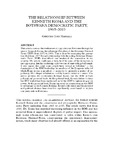| dc.contributor.author | Makgala, C.J. | |
| dc.date.accessioned | 2010-06-10T10:09:28Z | |
| dc.date.available | 2010-06-10T10:09:28Z | |
| dc.date.issued | 2005 | |
| dc.identifier.citation | Makgala. C.J. (2005) The relationship between Kenneth Koma and the Botswana Democratic Party, 1965-2003, African Affairs, Vol. 104, pp. 303-323 | en_US |
| dc.identifier.issn | 0001-9909 | |
| dc.identifier.uri | http://hdl.handle.net/10311/505 | |
| dc.description.abstract | This article assesses the weaknesses of opposition in Botswana through the
case of Kenneth Koma, the influential President of the Botswana National
Front (BNF) from 1977 to 2001. This is done by examining the perception
that from 1997 Koma’s relationship with the ruling Botswana Democratic
Party (BDP) destabilized and weakened the opposition in the
country. The article challenges a view, held by some of his detractors in
the opposition, that his leadership style was out of tune with global trends.
It also argues that what some people have viewed as ‘tribalism’ — the
domination of the BDP leadership by members of the Bangwato tribe (of
which Koma is also a member) — seems to be primarily a matter of expediency.
This alleged tribalism is used by Koma’s critics as a smear. The
article analyzes the relationship between Koma and the BDP at both
political and personal levels. At the political level, Koma’s failure to keep
the BNF united has been capitalized on by the BDP to tighten its grip on
power. At the personal level, Koma has used his connections in the BDP
to advantage in his business dealings. Koma’s cult status and his personal
and political choices have therefore significantly contributed to de facto
one-party rule in Botswana. | en_US |
| dc.language.iso | en | en_US |
| dc.publisher | Oxford university press/www.oup.com | en_US |
| dc.title | The relationship between Kenneth Koma and the Botswana Democratic Party, 1965-2003 | en_US |
| dc.type | Published Article | en_US |

